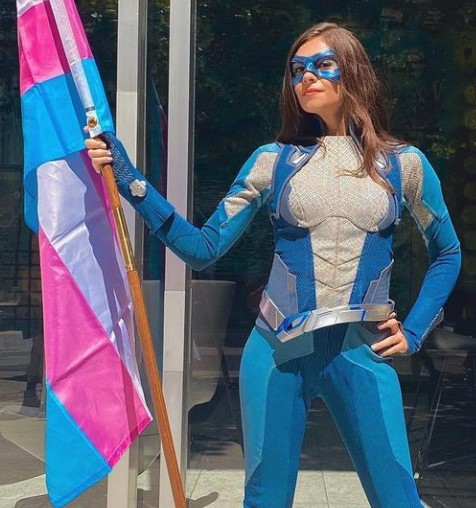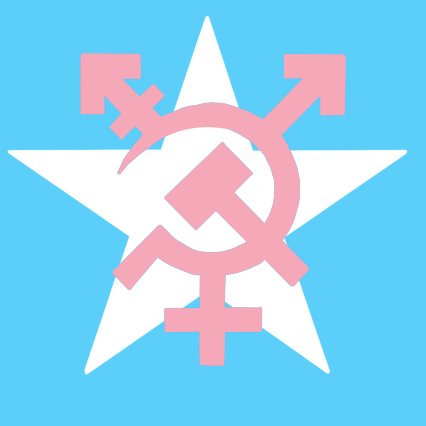Surprise! We’ve got another essay in the Transgender Marxism collection up for discussion.
The PDF is here – https://transreads.org/wp-content/uploads/2021/07/2021-07-15_60f0b3d5edcb7_jules-joanne-gleeson-transgender-marxism-1.pdf
The intro discussion, with links to all the essay discussions is here – https://lemmygrad.ml/post/395378
Tonight’s essay is How Do Gender Transitions Happen? by Jules Joanne Gleeson
Jules Joanne Gleeson is a Londoner living in Vienna. She has performed lectures and stand-up comedy internationally. Her essays have been published widely, including by Viewpoint Magazine, Invert, TSQ, Homintern, VICE, Oxford Art Journal and Salvage. Jules co-founded the Leftovers communist discussion group, has copyedited several Marxist monographs, and is writing a book about logic and hermaphrodites. She enjoys pop music, mystical texts and kettlebells.
As with previous discussions, I’ll be pulling quotes and making notes.
Feel free to join in and ask questions, make comments, learn something together with me!! (No time limit, I will always come back to these, so don’t feel like you can’t chime in just because you found this post like eight months late).
Edit: The next discussion, on an essay by Nat Raha, is here - https://lemmygrad.ml/post/408500


“Gendered traits can cause a considerable degree of anxiety during the transition process (just as cisgendered men might worry that wearing too much pink attire makes them seem ‘unmanly’, or a cis woman could be concerned a short haircut would leave her face appearing ‘mannish’).”
Throughout our explorations of transition, it is always important for us to remember that the mechanisms which serve to make trans lives so difficult, the enforcement and social reproduction of cisnormative gender hierarchies, are not a uniquely trans phenomenon.
Queer liberation is about the abolition of gender as a class structure, which should be the goal of any Marxist. Only through intersectional examinations of the myriad class structures capitalism has imposed on humanity can we ultimately craft a classless society.
Cis people are, as we spoke about in a previous essay (I want to say the Noah Zazanis one) ultimately the people who have most been subjected to the enforcement of gender classes. Who, through social reproduction of gender and through the punishment for nonconformity, have arrived ultimately at a cisgender identity with all of the restrictions on self-expression that entails.
“However, in most cases trans people will encounter immutable features they are unlikely to be able to do anything much to alter (the hip bones of trans men who transition post-puberty or the ribcages of trans women are two common examples).”
Rib cages??? I have never heard this one. Are people spending time worried about their rib cages? What’s that about? I have never…noticed any sort of deviation between a trans woman’s rib cage and a cis woman’s rib cage. Nor between the rib cages of cis men and cis women. Just never crossed my mind. Has anyone else encountered this?
“Taking up this outlook, many trans people have grown near obsessively astute in noticing, and itemising, gendered features of everyday presentation. Few of society’s arbitrary sexed associations or gender expectations today escape the discerning eye of anxious transsexuals”
Trans people really do become their own worst transvestigators. I think the wildest part is that before all of this trans panic nonsense, I really doubt people were trying to find rib cage or square jaw gotchas. In the 80s women wore fucking shoulderpads for heavens’ sake, and now we have people glaring down each other’s clavicles trying to suss out who the the real cissies are.
Not a lot of literary examples in the past attributing such minute details to either sex, but I guess the heightened fears of transition in such an excruciatingly examined and documented society have led trans people to be hyper critical of themselves. (and I know there are quite a few cis people doing the same). However it’s important to remember that even among cis people these are not sexual determinants, and cis people are getting “outed” as trans just as much over this, proving how deeply flawed the reasoning is.
“This perspective is notable for matching very closely to the perspective of the state: for instance, to satisfy the British Passport Office that your gender change is permanent enough for a corrected ‘sex’ entry, one currently needs the following: an assessment by a relevantly qualified medical professional, a letter from an employer or local authority confirming that your new identity is in use with them, and a completed deed poll”
As I mentioned, the pathologising of transition, and the focus on transmedicalism is in the state’s favour as a function of assimilation, extending the (few) rights of transition only to those privileged enough to pass their trials, while allowing the state to continue its attack on the poor queers, especially the racialised ones.
“In many cases compliance with this occurs on an obviously bad-faith basis: trans people passing through Gender Identity Clinics often wear more overtly gendercoded clothes than they would on a day-to-day basis, and provide an account of their daily lives and gender histories which they know to match the preferred model of ‘transsexuality’, in order to ensure access to hormones”
It’s usually recommended, when you want to transition, to present as hypermasculine or hyperfeminine (to like, a stereotypical degree) regardless of whether cis people behave that way or not, regardless on the degree to which you truly wish to present masculine or feminine (this is especially difficult for nonbinary or third-gender transitioners who wish to access hormones but do not conform to “transsexuality as a response to disordered gender dysphoria” narratives).
It’s also recommended, when you undergo your assessment with the psychiatrist that you tell them you feel “trapped in the wrong body” regardless of the truth of that experience. For a lot of trans people (myself included) this is not their conception of transition or their relation to their bodies, but it is the one most guaranteed to result in being approved for transition medications and transition paperwork.
View 2: transition as founded in community action
“When turning to trans communities, I should first clarify that what I have in mind is not any one entity called ‘the transgender community’”
That would be a pretty wild place to visit though.
“The notion of a unified community is one mostly appealing to career politicians, who are fond of imagining they might be able to interact with an entire tier of potential voters, through taking a single ‘representative’ out for lunch”
Yeah they really do that. Or like, someone will be like, “y’know, I’m not transphobic because I have a trans cousin and he said I was allowed to use the t-slur.”
Anyone who would be willing to sit down and have a pleasant lunch with a politician here in the Imperial core is not someone I would be in community with lol.
“there is not, has never been, and could never be one ‘trans community’”
Doubt anyone here would make this mistake but…just in case. Much like with every other community, people are divided across hierarchal class lines for many reasons: race, disability, gender, labour class, etc. Trans people are more likely to have commonalities due to certain shared experiences and oppressions, but that doesn’t make them inherently in community. Intersectionality is an understanding of all the different vectors of oppression we experience and the ways it shapes our material realities disparately.
Gleeson proposes instead thinking of “trans circles:” clubs, groups, community centres, forums, etc.
“Whereas the focus on the ‘encounter’ trans people must master in order to move through the world can tell us much, it’s not only interactions with strangers that form the core of self-realisation for many undergoing transition. Trans people most often draw strength from interacting with other souls like-minded enough (often, but not exclusively, trans themselves) who are able to offer them the specific support, mentoring, and reciprocal recognition that identity formation requires.”
This is the social reproduction of transition that we discussed earlier when examining the Social Cognitive Theory in the essay by Zazanis.
Through the non-hierarchal, community-based approach to social reproduction, not only are these trans circles able to offer transition to the individual, they offer transition to queerness itself. Sharing knowledge and experiences, finding commonalities and discussing differences deepens the circle’s understanding of queer identities and grows the practice of transition itself.
I’ve seen some trans girls mention their ribcage, but I think the overall dysphoria still relates to the way we compare our upper body proportions to cis women, similar to shoulder dysphoria
Yeah, I’ve definitely heard the shoulder one (and have experienced it myself, especially when getting clothes, there are things that would otherwise fit lovely but they’re just too tight on the shoulders). But ribcage surprises me, never heard it before. I wonder if hearing people mention it causes people to dwell on it more than they would on their own.
Oh definitely, and that goes for most insecurities tbh. Tiktok has really shown me how contagious illness- like insecurities can be.
As per usual, we are our own worst enemies at times. We’re beautiful people and we can’t forget that! Trans people are divinely beautiful!